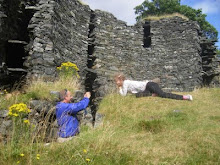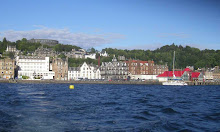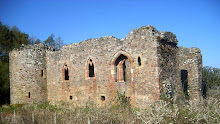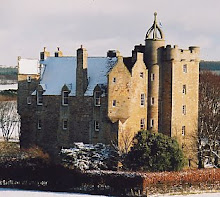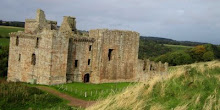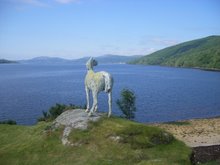A family group has just asked me to schedule a visit to Robert Burns birthplace. By coincidence I was there, at the new Burns Museum, last week.
I'm a great fan of Burns and, having been born and bred in Scotland, many words are familiar to me. But for those who do not enjoy that great privilege Burns can be a bit impenetrable! Take a daimen icker in a thrave for example; it's a line from 'To a Mouse'. Who has any idea what that means? (actually it means 'the occasional ear of corn in a set of sheaves').
I visited the museum with some other tour operators and we were inevitably concerned as to whether overseas clients would be able to understand it. The short answer was 'No'. Indeed the National Trust for Scotland has made the whole thing even less penetrable by writing the explanations on the show cabinets in Burnsian Scots, with difficult words translated. Not much good for overseas visitors.
But after a bit I mused that this is a celebration of Burns and his work. Should it not also be a celebration of his language? David Hopes, museum curator said, "Our intention has been to get under the skin of Burns, encouraging a creative response in the reader-visitor." A noble intention, and I think he has succeeded. But how important is the original language?
One translation of Burns into Russian apparently sold over 600,000 copies and Burns is still taught in Russian schools. But I'm sure Abraham Lincoln, who carried a volume of Burns' work with him, only read the original. And what of Steinbeck whose 'Of Mice and Men' was inspired by the ploughman poet and his line from 'To a Mouse': The best laid schemes o' mice an' men / Gang aft agley.'? How did he make sense of it? 'Translated' or not? Well, maybe some scholars can help me with that.
I do not believe that Scots is a language in its own right. But if traditional words and syntax are not used somewhere today, will it only be future academics who can revel in the earthiness and wonderful rhythms of Burns' poetry?
When I had seen the museum I wandered over to the old Brig o' Doon (of Tam o' Shanter fame) and the nearby Burns Monument, where I learned that there are 58 monuments to Burns around the world. Fifty-eight! More than any other poet.
This does not, of course, make him the world's greatest poet but it does convince me that Burns should not be celebrated in translation.
Showing posts sorted by date for query Lincoln. Sort by relevance Show all posts
Showing posts sorted by date for query Lincoln. Sort by relevance Show all posts
Tuesday, February 01, 2011
Sunday, January 25, 2009
Barack Obama and Robert Burns
It's always irritating to be beaten to a good idea! With the newspapers today packed with the words of these two plain speaking, egalitarian-minded men (today is the 250th anniversary of Burns' birth), it seemed a good idea to link the two. Unfortunately Emma Cowing in the Scotsman got there first.
I have written already of how Abraham Lincoln used to carry a volume of Burns around with him. Indeed I wrote then that Burns' passion for social justice fuelled the US leader's crusade to emancipate African-Americans.
Has President Obama read any Burns? I suspect not, but I think he would enjoy it...
I have written already of how Abraham Lincoln used to carry a volume of Burns around with him. Indeed I wrote then that Burns' passion for social justice fuelled the US leader's crusade to emancipate African-Americans.
Has President Obama read any Burns? I suspect not, but I think he would enjoy it...
The Tree of Liberty (circa 1789)
Wi' plenty o' sic trees I trow,
The warld would live in peace, man;
The sword wad help to mak a plough ,
The din o' war wad cease, man.
Like brethren in a common cause,
We'd on each other smile, man;
And equal rights and equal laws,
Wad gladden every isle man.
I would like to trawl through President Obama’s Inaugural Address and other speeches looking for parallels but the haggis is smelling good and I am being called on to mash the neeps!
It looks like a good evening. Och Aye. And we’ll tak a right guid willy waught, for auld lang syne.
Happy Burns Night!
Sunday, October 05, 2008
Robert Burns and Abraham Lincoln
I have previously referred to the influence of Robert Burns on Abraham Lincoln. Now a leading American academic, Dr Ferenc Morton Szasz, has published his findings that Lincoln could recite Burns' work by heart and that the Scot's passion for social justice fuelled the US leader's crusade to emancipate African-Americans. More detail in today's Scotland on Sunday.
The publication is timely as we approach 2009 and the 250th anniversary of the poet's birth, celebrated here in Scotland with the Year of Homecoming.


The publication is timely as we approach 2009 and the 250th anniversary of the poet's birth, celebrated here in Scotland with the Year of Homecoming.


Wednesday, April 25, 2007
Usher's Old Vatted Glenlivet
'Freedom and Whisky gang thegither', wrote Robert Burns in 1786. The fiery local spirit that he enjoyed so much now boasts worldwide brands, each with a sophisticated baggage of wood finishes and production techniques.
Burns would have been amazed!
 So was I, by the schedule for a day guiding an Australian couple: Glenfiddich, Macallan, Glenlivet. But all became clear, since Jarrod, bartender at the Castle Hill Tavern, Sydney, knew whisky and this was the highlight of his European trip!
So was I, by the schedule for a day guiding an Australian couple: Glenfiddich, Macallan, Glenlivet. But all became clear, since Jarrod, bartender at the Castle Hill Tavern, Sydney, knew whisky and this was the highlight of his European trip!
They enjoyed each distillery, but The Glenlivet seemed to take the honours. Glenlivet is also a favourite of mine for different reasons.
In Scotland we don't use the expression 'single malt'. It's either malt (from one distillery) or it's blended (many whiskies including grain whiskies). But it was not always so. To produce a consistent, and palatable brand in 1853 was a challenge and led to the first mixture of malts, known as a vatted malt (as opposed to a single malt). It was called Usher's Old Vatted Glenlivet or 'OVG' and is arguably the only vatted malt ever to have become an established brand.
Andrew Usher established himself as the pioneer of whisky blending: he already held the exclusive right to distribute Glenlivet south of the Highlands and in 1885 he founded a grain distillery in Edinburgh, so building the twin pillars of his success. In 1890 the firm of Andrew Usher & Co. of Leith had the largest bonded warehouse in the world.
I have only seen one Old Vatted Glenlivet bottle, and that was in my sister's farmhouse kitchen in East Lothian where it was filled with paraffin. It may still be there, but its presence was no coincidence, as Andrew Usher was our great grandfather.
 My connection with the great man promoted me, I think, from an average tour guide to an exceptional one in the view of these particular clients. And it may contribute to a good story one Burns Night, back in Sydney.
My connection with the great man promoted me, I think, from an average tour guide to an exceptional one in the view of these particular clients. And it may contribute to a good story one Burns Night, back in Sydney.
It seems 'Whisky' is still a little used word in the USA. I normally hear 'Scotch' or 'Single Malt'. So "Freedom and Whisky gang thegither" probably never resonated over there, even in 1786 when Freedom was quite an issue. But later, in the 1860s, whilst Andrew Usher was working his alchemy in Scotland, Abraham Lincoln was carrying a leather bound volume of Burns works with him wherever he went. When asked to propose a toast to the bard, he replied, "I can not frame a toast to Burns. I can say nothing worthy of his generous heart and transcendent genius."
Some might say the same of Andrew Usher whose generous heart stretched to bequeathing the City of Edinburgh with its fine concert venue, The Usher Hall. All on the back of The Glenlivet!
Burns would have been amazed!
 So was I, by the schedule for a day guiding an Australian couple: Glenfiddich, Macallan, Glenlivet. But all became clear, since Jarrod, bartender at the Castle Hill Tavern, Sydney, knew whisky and this was the highlight of his European trip!
So was I, by the schedule for a day guiding an Australian couple: Glenfiddich, Macallan, Glenlivet. But all became clear, since Jarrod, bartender at the Castle Hill Tavern, Sydney, knew whisky and this was the highlight of his European trip!They enjoyed each distillery, but The Glenlivet seemed to take the honours. Glenlivet is also a favourite of mine for different reasons.
In Scotland we don't use the expression 'single malt'. It's either malt (from one distillery) or it's blended (many whiskies including grain whiskies). But it was not always so. To produce a consistent, and palatable brand in 1853 was a challenge and led to the first mixture of malts, known as a vatted malt (as opposed to a single malt). It was called Usher's Old Vatted Glenlivet or 'OVG' and is arguably the only vatted malt ever to have become an established brand.
Andrew Usher established himself as the pioneer of whisky blending: he already held the exclusive right to distribute Glenlivet south of the Highlands and in 1885 he founded a grain distillery in Edinburgh, so building the twin pillars of his success. In 1890 the firm of Andrew Usher & Co. of Leith had the largest bonded warehouse in the world.
I have only seen one Old Vatted Glenlivet bottle, and that was in my sister's farmhouse kitchen in East Lothian where it was filled with paraffin. It may still be there, but its presence was no coincidence, as Andrew Usher was our great grandfather.
 My connection with the great man promoted me, I think, from an average tour guide to an exceptional one in the view of these particular clients. And it may contribute to a good story one Burns Night, back in Sydney.
My connection with the great man promoted me, I think, from an average tour guide to an exceptional one in the view of these particular clients. And it may contribute to a good story one Burns Night, back in Sydney.It seems 'Whisky' is still a little used word in the USA. I normally hear 'Scotch' or 'Single Malt'. So "Freedom and Whisky gang thegither" probably never resonated over there, even in 1786 when Freedom was quite an issue. But later, in the 1860s, whilst Andrew Usher was working his alchemy in Scotland, Abraham Lincoln was carrying a leather bound volume of Burns works with him wherever he went. When asked to propose a toast to the bard, he replied, "I can not frame a toast to Burns. I can say nothing worthy of his generous heart and transcendent genius."
Some might say the same of Andrew Usher whose generous heart stretched to bequeathing the City of Edinburgh with its fine concert venue, The Usher Hall. All on the back of The Glenlivet!
Subscribe to:
Comments (Atom)












































